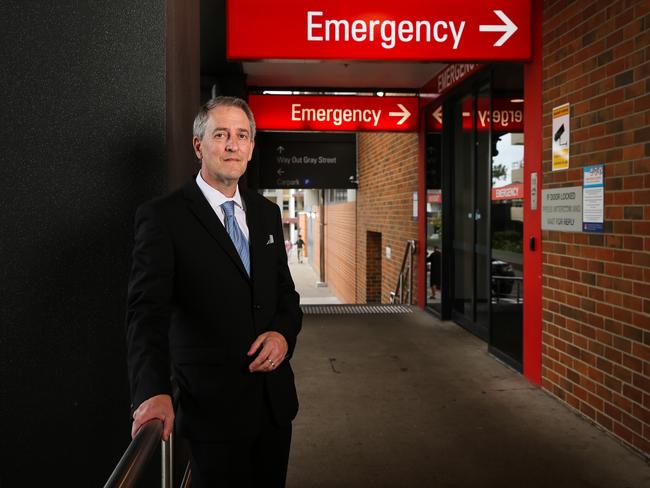Please don’t go: Why NSW psychiatrists must stay on the job
While a gradual loss of staff is damaging but manageable, a sudden exodus of this scale would be catastrophic for the whole health system.
Opinion
Don't miss out on the headlines from Opinion. Followed categories will be added to My News.
The mental health of Australians has been the cornerstone of my career. From my frontline work as a psychologist in major New South Wales hospitals to my current role as CEO of the Australian Patients Association, my focus has always been unwavering: putting patients first.
It is from this perspective that I find the looming mass resignation of 201 out of 260 public hospital staff specialist psychiatrists in New South Wales deeply troubling.
This drastic action, a response to unmet demands for improved employment conditions as part of industrial action, threatens to leave society’s most vulnerable—those experiencing psychosis, debilitating mental illness, suicidal crises, or without any safety net—without access to critical care. Such a coordinated withdrawal risks overwhelming an already fragile system, with devastating consequences for patients and their families.
This is not a viable outcome.
Workforce attrition in psychiatry due to burnout and systemic challenges is an existing and serious issue, but the intentional mass resignation of skilled professionals is profoundly different in both its intent and its impact.
While a gradual loss of staff is damaging but manageable, a sudden exodus of this scale would be catastrophic. The stakes are simply too high for this course of action.

Psychiatrists are advocating for a 25% pay increase to address critical workforce shortages in New South Wales, where one-third of public psychiatrist positions remain unfilled.
While their current average remuneration already places them among the top 1% of income earners, they assert that a pay increase is necessary to attract professionals back to the public sector.
This, they contend, would alleviate the overwhelming workload on those left to cover both their own duties and the gaps created by vacant roles, ultimately enhancing patient care and system sustainability.
Beyond the issue of remuneration, psychiatrists are also spotlighting the severe strain on New South Wales’ public mental health system. Overcrowded emergency departments, psychiatric wards operating perpetually at capacity, and inpatient units often characterised by violence and overwhelming stress all point to a system in crisis. The personal toll on psychiatrists working in such conditions is immense, testing even the most resilient professionals.

Let me be unequivocal: public hospital psychiatric services save lives. For individuals in profound despair, these services often represent their last and only hope. Emergency departments become lifelines, and the multidisciplinary teams—psychiatrists, nurses, psychologists, social workers, occupational therapists, and others—who deliver this care are the backbone of our mental health system. These professionals are driven by a deep sense of purpose and social justice, tirelessly supporting those in crisis. They deserve fair pay, improved conditions, and our utmost respect.
However, mass resignation is not the solution. I urge my colleagues to reconsider this drastic step. Advocacy, negotiation, and persistent dialogue remain the most powerful tools for driving change. A collective resignation, on the other hand, risks irreparable harm to the very patients we are all committed to serving.
This moment of crisis should instead be an opportunity to expose the intolerable realities of our overstretched mental health system. Shine a light on the anguish of discharging patients prematurely because there are no available beds. Speak out about turning away acutely unwell individuals because admission criteria have become impossibly restrictive. Expose the violence, distress, and unrelenting demands faced daily by mental health professionals in public hospitals.

These systemic failings demand urgent attention and resolution, but progress cannot come at the expense of patient safety. The mental health crisis is undeniable, but it must not be worsened by actions that further endanger those who depend on our care.
I say to psychiatrists, we, the public, need you—not only as clinicians but as leaders for reform. I implore you to stay—not in complacency, but in purpose. While it’s essential to address burnout and prioritise self-care, for those well enough to do so, remain in your roles, where your expertise is most needed, and continue to advocate with determination at the negotiating table. The government cannot engage meaningfully with an absent workforce, and the consequences of resignation will fall squarely on those who can least afford them—our patients.
This is a moment to demand the reforms that our mental health system so desperately needs. Advocacy does not have to come at the cost of care; it can drive systemic change while protecting those most at risk. For the sake of your patients, your colleagues, and the future of mental health care in New South Wales, I urge you to stay the course and fight for change from within. The stakes are too high, and your voice has never been more needed.
Lisa Robins, CEO Australian Patients Association




